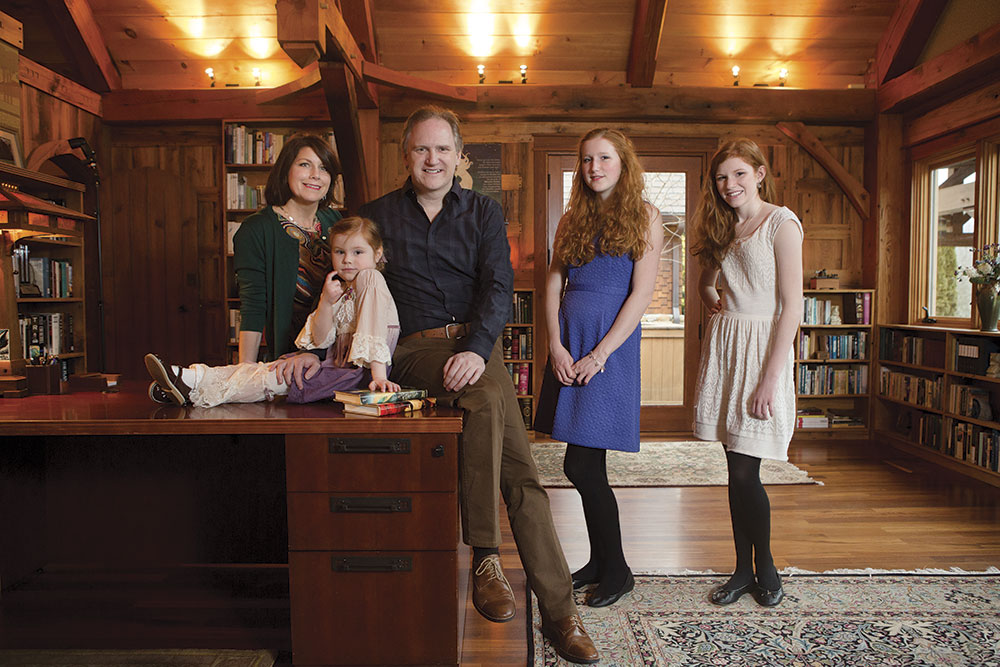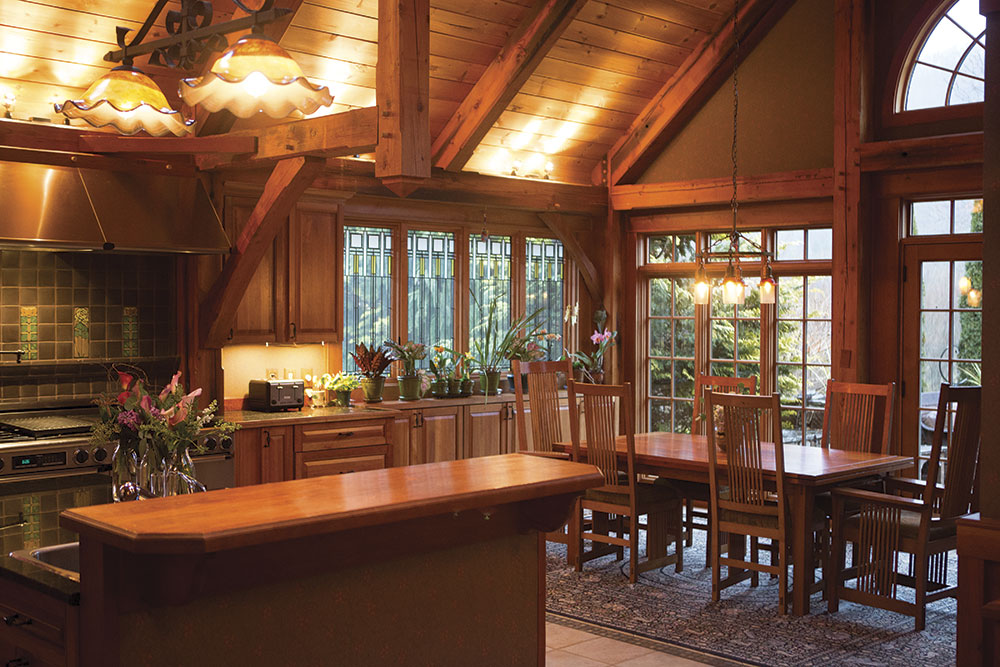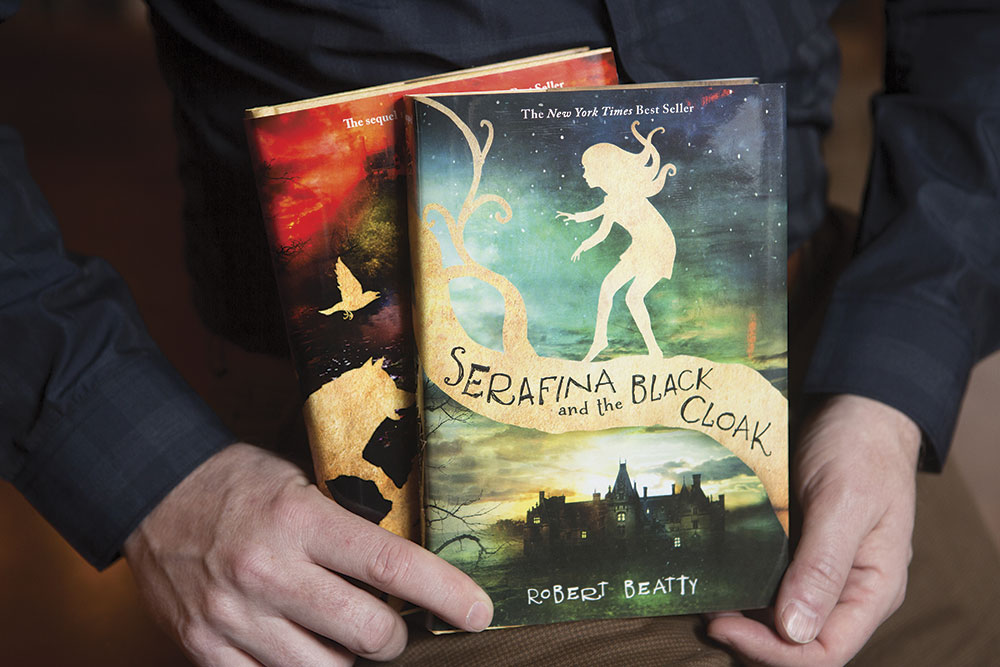
Robert Beatty walks down a short hallway from his master bedroom and enters the spacious office that doubles as his writing spot. Before he and his wife, Jennifer, bought the home and 30 acres that back up to Cane Creek, this room was the master bedroom, with a to-die-for mountain view out the back windows.
The two-bedroom house, though, needed to be reworked for their growing family. The couple now has three kids, several cats who constantly peek in the glass doors, and a handful of horses who graze the farmland. Clearly an animal lover, Beatty is a state-certified wildlife rehabilitator who has worked with mammals and reptiles as a volunteer at the WNC Nature Center.
Since acquiring the home 10 years ago, the family has made numerous changes, removing a pantry to open up the view in the kitchen, tearing down a closet near the front door to make a greater great room, and converting loft space to bedrooms.

Beatty’s office features wood paneling salvaged from a dilapidated barn on the property, and is filled with bookshelves. His books are sorted into collections — bird-watching guides, travel books, volumes of Ernest Hemingway and Jane Austen, and hundreds of others.
On a shelf behind his desk are five copies of Beatty’s New York Times best-selling young-adult novel Serafina and the Black Cloak, set memorably at Biltmore Estate. Each book is from a different printing of the historical fantasy novel that Beatty penned, collaborating with his wife and with daughters Camille and Genevieve (both teens) and pre-school-age Elizabeth.

The book spent 25 weeks on the bestseller list. Soon he’ll add another to the series, when Serafina and the Twisted Staff arrives on July 12. A third book has been purchased by his publisher, Disney Hyperion, and while Beatty knows the outline, he hasn’t begun to write it.
A 51-year-old who went from entrepreneur to full-time author, he has a cabin on his land, plus a barn that houses his robotics company. He and his daughters build robots for space and science museums in the barn’s first level, and he has a smaller, second writing space on the second floor.
The always-busy Beatty paused in his routine to answer questions about his writing from his main office.
You’ve filled your office with books. How much do you sit in here and read?
When I write I don’t read, because I’m an emulator. Not purposely — but if I read Hemingway, I’m going to write like Hemingway. Not as good as him, obviously, but if I read a lot of Hemingway, my brain will go there. If I do read while I’m writing, I read with a purpose. Let’s say I want to get a little Hemingway-esque, or more like Faulkner or like Thomas Wolfe if I want more ornate language — then I’ll read a few chapters of their books.
After you sold your business in Michigan 10 years ago, why did you choose the Asheville area to live?
One of the deciding factors is that I love the movie Last of the Mohicans. I was watching it one day and I said, “I want to live there. Wherever there is.” The story takes place in upper New York, but at the end, in the credits, it says thanks to Chimney Rock Park, the City of Asheville. I thought we should go have a look. We fell in love with the forests, the mountains, the waterfalls. It’s just paradise.
How important is it that from your desk, and from your breakfast area, that you have this mountain view coming in?
I enjoy the view. I love it. But I don’t think it’s necessary. I’ve sometimes said that I’d be a really good writer if they put me in prison and they gave me a word processor. I’d be happy as a writer. I could write in a more closed environment and be OK because it’s about the imagination.
Writing is a second career for you. How long have you wanted to do it?
I started writing when I was very young, and I was an avid reader of fantasy novels. One day I ran out of books to read. This was pre-Kindle, so I couldn’t just download them. My mom, who was a huge reader, said “Here, play with my typewriter.” It was an IBM electric. She literally meant play with it. [But] I immediately began writing novel-length stories.
They were awful. I was 12. I wasn’t even a good 12-year-old writer. I decided to keep doing that, though, and pursuing that. I’d give them to my friends and listen to what they were experiencing. I’d listen and then write another. I taught myself to write a story by listening to feedback I got from people. My goal was to be published at the ripe age of 15. I didn’t reach that goal.
What makes for your perfect writing day here at home?
First thing I need is quiet. I need silence more than anything. I stay up late and get up late. When I get up, I just walk into the office and start writing. That is, usually until something disturbs me and I can’t ignore. In an ideal world I’ll write from 8 to 12, then eat and write in the afternoon and eat and write in the evening.
How do you balance everything?
I don’t. I work obsessively and exhaustively. I haven’t done wildlife rehabilitation for months because I’ve been working on robots or working on the books. There have been times in my life where I can work 50 percent on the robots and 50 percent on the books, but that stopped with Serafina. The marketing became my full-time job. I was just enjoying the challenge of “How do I get this in front of people?” It almost made me mad that I had to stop that and write, which is stupid and backwards — but once I switched, I remembered writing was what I loved the most. Balance is difficult.
To find updates on Robert Beatty and his series of bestselling young-adult books, see robert-beatty.com.

Comments are closed.